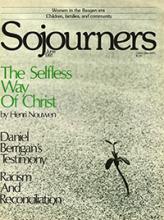The Reagan administration is on the receiving end of a vocal church witness, the unity, numbers, and intensity of which appear to dwarf that of any similar effort around a foreign policy issue in this century. That common voice coming from the churches across the U.S. is calling for an end to U.S. military aid to El Salvador.
Local councils of churches, who have often had to scramble in the past to find tangible matters around which to foster ecumenical accord, are vigiling, marching, leafletting, worshiping, and praying together.
The U.S. Roman Catholic Church, its lay members as well as its bishops, priests, and religious, has led in opposing U.S. military aid. Indeed, there is a striking degree of coherence between the clergy and the laity within the Catholic Church on this issue.
"It is not often that activists [in the Church] cite their bishop's statements with such enthusiasm," noted Tom Quigley, Latin America adviser to the U.S. Catholic Conference of Bishops (USCC).
In virtually every Protestant denomination, nationally elected church leaders have signed petitions and statements which have as their common theme opposition to U.S. arms aid. Some denominational heads have even marched in street demonstrations to protest U.S. policy toward El Salvador.
The religious activists are growing increasingly active. Led by their bishops and ministers, more than 3,000 Christians from virtually every denomination throughout Washington state marched together in a Palm Sunday procession in Seattle to publicly "stand with Archbishop [Oscar] Romero by supporting his plea that the U.S. not intervene in El Salvador." (That plea was made more than one year ago by the El Salvador archbishop, just before he was assassinated on March 24, 1980. It has been the central theme of the many commemoration services for Romero and other Salvadoran martyrs that were held in March of this year.)
Read the Full Article

